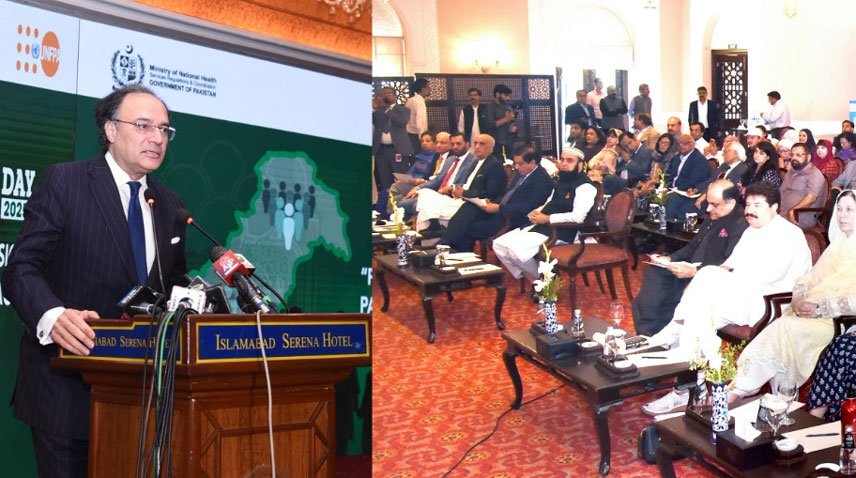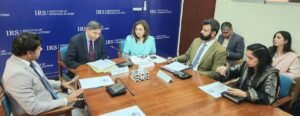
Finance Minister Highlights Urgent Need for Population Management and Human Capital Investment at World Population Day Event
Islamabad : Federal Minister for Finance and Revenue, Senator Muhammad Aurangzeb, addressed a high-level national event organized by the Ministry of National Health Services, Regulations and Coordination to mark World Population Day. The event was attended by Federal Minister for National Health Services Syed Mustafa Kamal, Federal Minister for Planning, Development and Special Initiatives Ahsan Iqbal, Minister for Parliamentary Affairs Dr. Tariq Fazal Chaudhry, as well as prominent religious scholars, members of civil society, and senior government officials.
Finance Minister underscored that under the leadership of Prime Minister Muhammad Shehbaz Sharif, the government is pursuing a broad-based reform agenda covering key areas such as taxation, energy, state-owned enterprises, and privatization. He emphasized, however, that sustainable economic growth—aimed at realizing the vision of Pakistan becoming a $3 trillion economy by 2047—would remain elusive unless the country squarely addresses two critical existential challenges: climate change and population growth.
Senator Aurangzeb drew attention to Pakistan’s population growth rate of 2.55 percent and its alarming implications for national development, economic planning, and social well-being. Citing the fact that 40 percent of children under five in Pakistan suffer from stunted growth, he warned that the country’s future leadership is already at risk. He stressed that addressing stunting and learning poverty requires an integrated, end-to-end approach, encompassing nutrition, sanitation, clean drinking water, birth spacing, and greater awareness—all of which were discussed by scholars and experts at the event.
The Finance Minister also highlighted the importance of empowering women, who constitute half the country’s population, noting that inclusive workforce participation is essential for Pakistan’s sustainable development. He reiterated the need to tackle learning poverty, especially among girls, and to invest meaningfully in education and skills development to enable women to contribute productively to the economy.
Turning to fiscal policy, Senator Aurangzeb supported calls for population to be recognized as a core allocation criterion in the National Finance Commission (NFC) Award. He agreed with the views expressed by the Health and Planning Ministers, advocating for the inclusion of broader human development indices to guide equitable resource distribution between the federation and provinces.
He emphasized the need for a paradigm shift in national budgeting. Rather than compartmentalizing federal and provincial finances, he proposed a unified, country-level approach to development spending. Citing this year’s development budget of Rs. 1 trillion at the federal level and Rs. 4.2 trillion when including provinces, he noted that the real challenge is not the availability of funds but their optimal allocation and prioritization.
Senator Aurangzeb also called for a reorientation of donor engagement and development financing. He remarked that while infrastructure had been the primary recipient of international funding in the past, it is now imperative to direct those resources toward human capital development, particularly in health, education, and population planning.
He referenced Pakistan’s 10-year Country Partnership Framework with the World Bank, noting that four out of its six pillars focus on population and climate-related issues. He informed the gathering that one-third of the total funding—amounting to nearly $20 billion over a decade, or around $600–700 million annually—will be dedicated to population-related measures. He urged that such resources must be strategically deployed, moving beyond symbolic steps like tax relief on contraceptives, and instead ensuring impactful investments across the board.
The Finance Minister concluded by reaffirming the government’s commitment to prioritizing long-term, sustainable solutions to Pakistan’s population challenges and leveraging both domestic and international resources to build a healthier, more productive nation.







